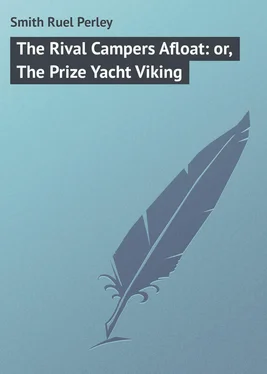Ruel Smith - The Rival Campers Afloat - or, The Prize Yacht Viking
Здесь есть возможность читать онлайн «Ruel Smith - The Rival Campers Afloat - or, The Prize Yacht Viking» — ознакомительный отрывок электронной книги совершенно бесплатно, а после прочтения отрывка купить полную версию. В некоторых случаях можно слушать аудио, скачать через торрент в формате fb2 и присутствует краткое содержание. Жанр: foreign_prose, Морские приключения, на английском языке. Описание произведения, (предисловие) а так же отзывы посетителей доступны на портале библиотеки ЛибКат.
- Название:The Rival Campers Afloat: or, The Prize Yacht Viking
- Автор:
- Жанр:
- Год:неизвестен
- ISBN:нет данных
- Рейтинг книги:4 / 5. Голосов: 1
-
Избранное:Добавить в избранное
- Отзывы:
-
Ваша оценка:
- 80
- 1
- 2
- 3
- 4
- 5
The Rival Campers Afloat: or, The Prize Yacht Viking: краткое содержание, описание и аннотация
Предлагаем к чтению аннотацию, описание, краткое содержание или предисловие (зависит от того, что написал сам автор книги «The Rival Campers Afloat: or, The Prize Yacht Viking»). Если вы не нашли необходимую информацию о книге — напишите в комментариях, мы постараемся отыскать её.
The Rival Campers Afloat: or, The Prize Yacht Viking — читать онлайн ознакомительный отрывок
Ниже представлен текст книги, разбитый по страницам. Система сохранения места последней прочитанной страницы, позволяет с удобством читать онлайн бесплатно книгу «The Rival Campers Afloat: or, The Prize Yacht Viking», без необходимости каждый раз заново искать на чём Вы остановились. Поставьте закладку, и сможете в любой момент перейти на страницу, на которой закончили чтение.
Интервал:
Закладка:
“Come on over to the post-office with me,” he said. “You’re in no hurry for supper. It’s my turn to go for the mail, and we are expecting a letter from father up in Benton.”
So the two boys retraced their steps, and the three friends went along up the road together.
“We haven’t a very extensive correspondence to look after, eh, Jack?” remarked Henry Burns; “but we’ll go along for company’s sake. My aunt never writes to me, and I think I never received but two letters in my life. They were from old Mrs. Newcome.”
“I never got any,” declared Harvey. “My dad says to me at the beginning of the summer, ‘Where are you going?’ and I say, ‘Oh, down in the bay,’ or wherever it is I am going. Then he says, ‘Well, take care of yourself,’ and forgets all about me, except he sends money down to me regularly – and more when I ask him.”
The boy’s remark was, in fact, an unconscious criticism of the elder Harvey, and accounted, perhaps, for some of Harvey’s past adventures which were not altogether commendable. Harvey’s father was of the rough and ready sort. He had made money in the Western gold-fields, where he had started out as a miner and prospector. Now he was enjoying it in generous fashion, and denied his family nothing. He had a theory that a boy that had the “right stuff in him,” as he put it, would make his way without any particular care taken of him; and he was content to allow his son, Jack, to do whatever he pleased. A convenient arrangement, by the way, which also left Mr. Harvey free to do whatever he pleased, without the worry of family affairs.
The boys walked through the fields, up a gentle incline of the land, which led to the general higher level of the island, overlooking the bay and the islands in the distance. They gazed back presently upon a pleasing prospect.
There was the cove, sweeping in to the left, along the bluff opposite, which was high and rock-ribbed. At the head of the cove the shores were of clean, fine sand, broken here and there at intervals by a few patches of clam-flats, bared at low water. Out from where the boys stood, straight ahead rolled the bay, with an unbroken view away across to the cape, some five miles off. A thoroughfare, or reach, extended south and eastward from the cape, formed by the mainland and a chain of islands. Then, to the south, the bay extended far, broken only by some islands a few miles away.
At anchor in the cove lay the Warren boys’ sailboat, the Spray , and the larger yacht, the Viking .
“Well, George,” said Henry Burns, with his right arm over the other’s shoulder, “it looks like some fun, now that the trouble with Squire Brackett is cleared away.”
“Great!” exclaimed George Warren.
The post-office, called such by courtesy, the office consisting of the spare room of whatsoever fisherman or farmer happened to be honoured with Uncle Sam’s appointment, was about a mile from the harbour of Southport. It was, in this case, in the house of one Jerry Bryant, and was about a quarter of a mile, or less, from the western shore of the island, where a small cove made in from that bay.
“Good evening, Mr. Bryant,” said George Warren, as they arrived at the post-office door. “Mail in yet?”
“Be here right away,” replied the postmaster. “I saw Jeff’s packet coming in a moment ago. There he comes now up the lane.”
Jeff Hackett, whose commission it was to fetch the mail across from the mainland in a small sloop daily, now appeared with a mail-sack over his shoulder.
The formality of receiving the attenuated mail-sack and sorting its somewhat meagre contents, being duly observed, Postmaster Bryant threw open a small sliding door, poked his head out, and was ready for inquiries.
“Anything for the Warren cottage?”
“Not a thing.”
“Anything for the neighbours, a few doors below?”
“Nothing for them, either.”
“Looks as though we had come over for nothing,” said George Warren. “Too bad, but you fellows don’t mind the walk, do you?”
“Not a bit,” answered Henry Burns.
They were departing, when the postmaster hailed them.
“Say,” he called out, “who is Jack Harvey? He is the chap that caught Chambers, isn’t he? Doesn’t he stop over near you, somewhere?”
“Here I am,” said Harvey, taken by surprise. “What do you want?”
“Why, I’ve got a letter for you,” said the postmaster. “It has been here three days. I couldn’t find out where you were.”
“Well, that’s odd,” exclaimed Harvey, stepping back and receiving the envelope. “I never got one before. Say, we came over for something, after all.”
He tore open the envelope and read the letter enclosed.
“Whew!” he exclaimed as he finished. “That’s tough.” And he gave a disconsolate whistle.
“What’s the matter? Nothing bad, I hope,” asked Henry Burns.
In reply, Harvey handed him the letter. It was dated from Boston, and read as follows:
“My dear Jack: – Sorry to have to write you bad news, but you are big enough to stand it, I had to work hard when I was a boy, and perhaps you may now, but you’ll come out all right in the end. I don’t know just where I stand, myself. Investments have gone wrong, and Saunders has brought suit in court, claiming title to the land where the mine is. May beat him out. Don’t know. He is a rascal, but may win.
“Now I haven’t got a dollar to send you, and don’t see where I’ll get any all summer for you, as I shall need every cent to pay bills. I have got to go out to borrow money to pay lawyers, too, to fight the case.
“Too bad, but you will have to come home, or shift for yourself for the summer. Let me know, and I’ll send money for your fare, if you are coming.
“Affectionately, your dad, “William Harvey.”An hour later, Jack Harvey and Henry Burns sat in the comfortable cabin of the Viking , talking matters over. The yacht swung lazily at anchor in the still cove. A fire burned in the little stove, and the smoke wreathed out of a funnel on the starboard side. The boys were superintending the baking of a pan of muffins in a sheet-iron oven, while two swinging-lanterns gave them light.
“I declare I don’t know what to do about it,” said Harvey. “You see, I never thought about getting along without money before. All I have had to do is just ask for it. Now, you see, I’m behind on my allowance. We paid Reed thirty-five dollars, you know, for wintering and painting the boat, and something more for some new pieces of rigging. That, and what I’ve spent for clothes, has cleaned me out.”
“Yes, but I owe you twelve dollars on the boat account, which I’m going to pay as soon as I receive my own allowance from my aunt,” said Henry Burns.
“Well, that won’t go very far,” responded Harvey, gloomily. “We owe – or shall owe – for the freight on that box of provisions that’s coming from Benton; we have got to hire a tender to take the place of the old one I sold last fall. We can’t keep on borrowing this one all summer – ”
“Never mind,” interrupted Henry Burns. “You know it costs us scarcely anything to live down here. We can catch all the fish and lobsters we want, dig clams, and all that sort of thing. All we need to buy is a little meal and flour and coffee and sugar from time to time, and we’ll do that all right on my allowance.”
“That’s kind in you, Henry,” said Harvey, warmly, “but I don’t quite like the idea of living all summer on you.”
“Why not?” demanded Henry Burns, and added, quickly, “You used to provide everything for all your crew last summer, didn’t you?”
“Why, yes, I did,” replied Harvey. “Ha! ha! catch one of them buying anything. But of course they couldn’t buy much of anything, anyway. They hadn’t any money. But somehow this is different. You see, – well – the fact is, I’m not quite used to being hard up. And I don’t exactly like to take it. Of course, I know just how you mean it, too.”
Читать дальшеИнтервал:
Закладка:
Похожие книги на «The Rival Campers Afloat: or, The Prize Yacht Viking»
Представляем Вашему вниманию похожие книги на «The Rival Campers Afloat: or, The Prize Yacht Viking» списком для выбора. Мы отобрали схожую по названию и смыслу литературу в надежде предоставить читателям больше вариантов отыскать новые, интересные, ещё непрочитанные произведения.
Обсуждение, отзывы о книге «The Rival Campers Afloat: or, The Prize Yacht Viking» и просто собственные мнения читателей. Оставьте ваши комментарии, напишите, что Вы думаете о произведении, его смысле или главных героях. Укажите что конкретно понравилось, а что нет, и почему Вы так считаете.












